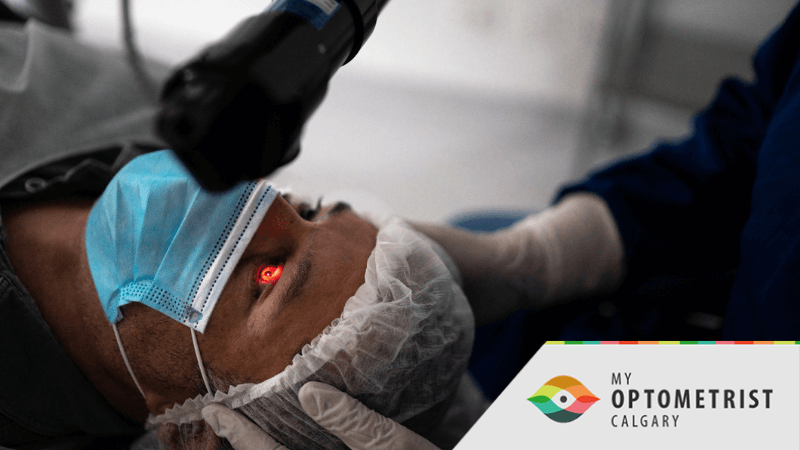
Cataracts are the most common cause of vision loss in people over 40, however, cataract surgery is a common procedure that typically yields results that last a lifetime. Once you have been diagnosed with cataracts and the severity of the condition has been assessed, you may be recommended for cataracts surgery. This is a very quick day surgery that typically only takes about 10 to 20 minutes and has a fairly quick recovery time. For those about to have cataract surgery and want to know more about it, Dr. Bernadette Osiowy has answered all of your basic cataract surgery questions to help you feel prepared for your pending cataract surgery.
What Dr. Osiowy Wants You To Know About Cataract Surgery
How Do You Decide The Best Surgeon For Me?
We have many great surgeons to choose from in Calgary. We make referrals to surgeons based on numerous considerations such as other eye health conditions (like glaucoma or macular degeneration), surgeon reputation, wait time, and type of lens implant correction options that are required for the best post-surgical vision outcome.
What Options Do I Need To Consider?
- The Type Of Lens Implant. When cataract surgery is performed, the cloudy lens is removed from the eye, leaving an empty, clear capsule (like a sac) in which the Intra-Ocular Lens implant (IOL) is inserted. There are numerous types of IOL options to be considered based on current prescription, including whether you need to correct astigmatism, near- or far-sightedness, or if you are considering a multi-focal implant that combines near and far correction. It is very helpful if your optometrist who has known you, your vision, your prescription, and your lifestyle, can ultimately help you set appropriate expectations and select the best IOL choice.
- Dry Eye. Post-surgical comfort and outcomes are improved if your eyes are hydrated and healthy prior to the surgery. We can help with pre-surgical treatments to enhance your comfort and success. To further increase your healing and vision outcomes, your optometrist can recommend treatments to ensure your eyelids and tears glands are clear and working well. We will make recommendations to help with dry eyes and lid care.
- Previous Medical Conditions. Other medical conditions and medications are reviewed and advised if any modifications are required before surgery.
- Rest And Recovery. Be prepared to reduce tasks and activities that require heavy lifting and extended use of your eyes. Be prepared to allow time to rest and recuperate.
What Happens After Cataract Surgery?
Your surgeon will provide a detailed care plan of drops to use both before and after the surgery. Be sure to moisturize your eyes with approved moisture drops between the application of the prescription drops.
You will be seen the day after, one to two weeks later, and a final six weeks following the surgery before your after-surgery eyeglass prescription is finalized. Depending on the type of lens implant that was chosen, you may still need glasses for distance, nearness, or both, but it will most certainly be much less of a prescription than before the surgery!
If you are having cataract surgery on both eyes, there is most often a two-week separation between the two procedures. If you only need one eye done at a time, we will ensure that the final post-surgery vision is well matched between the eyes.
What Happens If There Are Any Problems With The Surgery?
During the postoperative assessments, your eye doctor will check the eye pressure, implant position, and healing throughout the eye. If there are any concerns about vision, eye pressure, or other reactions, your doctor will understand the healing stages and what to do to alter treatments and explain changes along the way. You may be seen more often to ensure you are comfortable and ultimately have the best outcome.
If You Have Cataracts, Contact My Optometrist For Assistance
Your family optometrist at one of the My Optometrist Calgary locations will advise you if you have any degree of cataracts, how they are affecting you at the time, what can be done to improve your vision and expectations for possible surgical care. The optometrist will guide you through the decision process when it is time to be referred for surgery. One of the best things you can do for yourself is to develop and maintain a long-term eye care history with your optometrist. To book an appointment with our highly skilled staff, call either our Sunridge, NE, Sundance, SE, or Three Hills, AB locations or fill out the online contact form
FAQ
Q: How long does it take to recover from cataract surgery?
A: It typically takes around 8 weeks for the eye to complete most of its healing, but you should be able to resume regular activity that does not include eye strain or heavy lifting in less than 24 hours.
Q: What are the most common types of cataracts?
A: Most cataracts are due to aging and are known as nuclear sclerotic cataracts. However, there are other types of cataracts: traumatic cataracts are cataracts that have developed due to injury; congenital cataracts are present at birth and may or may not affect vision; a radiation cataract is caused by exposure to certain types of radiation. Cataracts develop at different rates and affect vision more or less dramatically based on what part of the lens they are located in, or how dense they are. Cortical cataracts present like crystal-like spokes starting from the outer part of the lens and grow inwards. Posterior subcapsular cataracts start at the back outer layers of the lens and often are more centrally located
Q: How long does it take to recover from cataract surgery?
A: A magnification system called a slit-lamp biomicroscope is used to see the layers of the eye from the front, through the middle, and to the back of the eye. Using different lighting and magnification, we can assess the type, location, and density of the cataract.